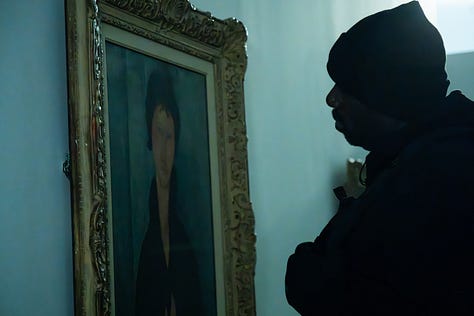Something to watch this month: 28 May-29 June
Preview: Intrepid French Film Festival Aotearoa 2025



While the Italians make their slow-but-steady way around the country for 11 months, the French Film Festival packs all its activity into four weeks from today – at 35 cinemas in 21 centres. There are 23 feature titles in the programme and, unlike the Italians who like to go back to the classics, these are all brand new.
I only got to preview three of the 23 so I won’t pretend that they are in any way representative, in fact they feel suitably random.
This week I finally read Robert Bresson’s famous 1975 manifesto Notes on the Cinematographer. I’ve had my pre-loved copy for at least ten years and this edition was published in 1986 (and is helpfully annotated by the previous owner).
Bresson’s definition of cinematographer isn’t the camera or lighting director as we understand it now. He was making a distinction between cinema (defined by him as filmed theatre with all of the inauthenticity that entails) and cinematography – an essential and unmanipulated filmed truth. Bresson doesn’t argue that there’s anything wrong with theatre per se, just that attempting to recreate the artifice of theatre with a camera is the wrong approach:
The photographed theatre or CINEMA requires a metteur-en-scène or director to make some actors perform a play and to photograph these actors performing the play; afterwards he lines up the images. Bastard theatre lacking what makes theatre: material presence of living actors, direct action of the audience on the actors.
He is scathing of acting for camera and he describes the talent he photographs as “models” rather than “actors”:
In a mixture of true and false, the true brings out the false, the false hinders belief in the true. An actor simulating fear of shipwreck on the deck of a real ship battered by a real storm – we believe in neither the actor, nor in the ship nor in the storm.
I think Tom Cruise might have something to say about that.
Bresson was losing this argument even as he was writing these notes in the 1950s and definitive proof of that loss can be found in the three films I preview here. Yet, I couldn’t help feeling as I was watching them that truth – Bressonian truth, human truth, emotional truth – was never what these films were interested in and that maybe, thanks to Bresson, I was seeing feelings being manufactured in front of me more than usual.
The programme launch film Les règles de l'art has the terrible English title, The French Job to kindle memories of Michael Caine’s 60s heist film The Italian Job, a comparison that does neither film any favours. Based on an unlikely true story, it’s about a burglary at the Paris Museum of Modern Art and the attempts by the thieves to successfully fence some of the most famous paintings in the world. Actually, nobody knows for sure what happened to them and Dominique Baumard’s film is a fanciful and entertaining imagining of the whole affair.


